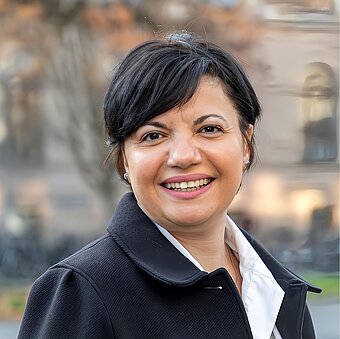

Welcome to my professional website! My name is Selma Saidi, and I am a full professor (W3) in the field of computer engineering at TU Braunschweig, one of Germany's leading TU9 universities renowned for excellence in engineering. I am head of the Institute of Computer and Network Engineering (IDA).
If you would like to reach out, please feel free to write me an email or directly make an appointment via the secretary's office: secretariat(at)ida.ing.tu-bs.de
I hold a PhD in Computer Engineering from the University of Joseph Fourier in Grenoble, France. I conducted my PhD between VERIMAG and the Advanced System Technology Computing R&D department at STMicroelectronics, one of the top semiconductor manufacturers in Europe and in the world. VERIMAG is an internationally leading research institute in formal methods for designing reliable embedded computer systems. The institute was founded by Turing prize winner Joseph Sifakis.
For more than 10 years I have been involved in various disciplines of development, implementation, and validation/verification of computer systems. My research focus has been on the design, implementation, and validation of innovative intelligent computing systems where connectivity, real-time, and safety requirements play an important role. I focus on the development of novel hardware and software design methods for networked and collaborative embedded and autonomous systems with performance, predictability, and self-adaptability requirements. The results and findings of my research activities have been published in outstanding conferences and journals in the field of hardware and software design and verification, e.g., RTSS, DAC, DATE, ICCAD, IEEE Design and Test Magazine, and ACM Transactions Journal on Embedded Computing Systems.
As a scientist, I am currently deeply engaged with developing novel computing paradigms for collective decision-making in autonomous systems. The aim is to enable the design of collaborative, safe, and real-time decision-making for autonomous systems operating in complex environments and additionally meeting safety-critical requirements. This complex problem goes through solving several challenges in guaranteeing the timeliness of receiving data over complex compute and communication infrastructure, improving the trustworthiness of data information and the study of how it can contribute to collaborative decision making through aggregation to provide more reliable and safe autonomous services.
I am passionate about developing innovative solutions for challenging yet interesting problems, where utility is key for the future. I like to start from a practical problem, develop a mathematical formulation for it considering realistic assumptions, and then transfer the solution back to the real system. My research style is a successful combination of fundamental research and prototyping for industry-driven application. I regularly use theoretical foundations with formal methods and performance analysis tools as well as practical hardware and software implementations involving details of the underlying execution platform. My main goal is always to bridge the gap between abstract high-level models and practicality by providing accurate and sound hardware and software models, formalisms, and mechanisms that capture the main characteristics of the system and that are later validated using implementation on the actual (real) platforms. With my recent interest in the field of autonomous systems, I also discovered my taste for borrowing concepts from cross-domain disciplines such as philosophy and sociology and promoting interdisciplinary research. I am as well steering my research activities towards application areas where the impact for society is significant and can ultimately help improve people's lives, which as well contributes to increasing the societal acceptance of research and development activities and promotes technology transfer. Below is a collection of areas we are working on,
Thank you for visiting my website. Looking forward to your discussion and collaborations!